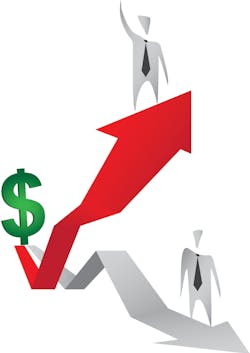Selling vending and coffee service in a saturated market is tough. How can a company stand out, and really offer a location something different? That's where added value comes in. For a location, it means getting something they are unable to get themselves, whether it's reliable access to the right product mix, help with sustainability, or versatile payment options. For operators, added value allows them to increase profit margins, lower commissions or simply win an account. Often, the right added value can give operators leverage in a contract that will benefit them. But adding value isn't business as usual.
Intangibles add value
The fact that operators can offer snacks and soda doesn't add value for locations because the products are available in many different places, explained Randy Munn, director of sales and marketing for C.L. Swanson Corp., in Madison, Wis. A machine that is clean, filled and working is the bare minimum level of service. Munn believes vending operators need to find a way to add more value to the product they're selling than the product at the convenience store. "If you can't add value to that can of (soda) the only thing that matters to the customer is price," Munn said.
For Munn, adding value is all about intangibles. "One of the ways you can add value is developing relationships with the general manager, the location contact, " said Munn. This is specific communication outside the job of the route driver. It's also imperative to periodically sit down with the client and get a feel for how the company is doing, like a service report card.
Focusing on the fresh food operators bring to an account is also a must for added value, explained Munn. The quality, variety, selection and price are paramount. On any day, customers should be able to trust there's something in the machine they'll want to eat, it's good quality and the price point makes it a value to them.
The only way to know if customers feel this way about the food offerings is to seek their feedback, which is another way Munn provides added value. "We have an organized program called 'We Want To Know,'" Munn said. There are cards to fill out at vending machines, online surveys and even boards for notes to the route drivers. Munn admits he was leery of this last idea, but it has worked with significantly less issues than he'd feared. "That's because so few customers get to comment on what they're forced to buy," said Munn.
Munn favors added value that benefits both the location as well as the end users, such as putting coffee brewer on winner mode, where every 50th cup is free. It also includes health and wellness programs, where end users are requesting healthier products, and locations want a healthier workforce. "We have an organized program called 'Better For You' overseen by a registered dietician," said Munn. "It's added value because the average operators doesn't do that."
While Munn offers energy saving features on his machine, such as LED lights, he finds it's more valuable to the location, than the end user, so it's not one of his top added value options.
Added value allows Munn to charge a premium price for his products, maybe 5 cent more than competitors' prices, but there's a limit to what locations and end users will pay.
Tailor value added options
Richard Harvey, president of A & R Services in Monument, Colo., believes added value is always important in selling service, and deciding what to offer takes some digging. "You have to look at each client," he said. "You ask 'What do you want', and then ask 'how can I help you achieve it?'"
In locations that crave more up-to-date payment options, Harvey offers cashless payment systems, bill recyclers and self checkout micro markets (SCMM). These systems usually warrant a price increase/commission negotiation, but are good for locations willing to pay for it.
"Customers want faster, bigger and more variety," said Harvey. This makes SCMMs an especially popular added value items. "It provides something our clients want," he said. "But it has its place. You can't put it everywhere."
On the OCS side, Harvey has started thinking outside the box. Customers were always asking for healthier items, so his company began offering delivery of fresh fruits, along with coffee. "Not everyone drinks coffee," said Harvey. The fruit is a way locations can offer something to those non-coffee drinkers that is also healthy. "As long as the company is willing to pay for it, I deliver things our competitors aren't capable of delivering," Harvey said.
Ancillary products like condiment packets, utensils, and napkins were once considered added value, but that's changed. "If you want to sell food, you have to have ketchup packets or spoons," Harvey said, "These are the items people need (in order) to eat it." The only time these items become added value is if a location wants to offer something specific, like the expensive, sustainable utensils made of corn starch. "If I have a client who wants it, I'll sell it to them," Harvey said.
Kyle Yost, Denver market sales for Premier Services and Alpine Roastery in Englewood, Colo., is most successful with accounts when he pairs vending and coffee service. "I take a percentage of their vending sales and apply it directly to their coffee bill," he said. It acts as a commission, but no money is actually sent to the location. "I closed an account just last week with this," he added.
Even when he's using SCMMs to sell an account, coffee becomes a great value added. When a location wants to install a SCMM, offer premium coffee, but still maintain lower prices. He suggests the addition of a single-cup brewer where coffee can be purchased by the employee. Elsewhere, the location still offers free, regular brewed coffee to their employees. Employees appreciate the two options presented by the location.
The coffee can also make a difference. Alpine Roastery works directly with farmers in Africa to grow coffee beans. There's a mill in Cameroon that grinds the beans and then it's shipped directly to Alpine Roastery in Colorado. "There's no middle man," said Yost. That allows Alpine to control the quality, while keeping the price lower, both of which Yost considers important added value to locations.
When Yost sells a SCMMs, he adds more than just coffee to make it work for a location. "You need to dress the market up to the white collar atmosphere -- display salads and fruits -- and it will succeed," he said. "If you treat the market like a vending machine, it won't do well."
Yost has even seen SCMMs used to help locations control supply costs, such as replacement safety glasses in a factory setting.
Health and wellness are a must
"The added value of micro markets is vast to customers," said Ray Friedrich, CEO of Sterling Services in Canton, Mich. And for these college educated customers of SCMMs, Friedrich focuses on health and wellness products as added value.
"We have a pretty strong (health and wellness) program in both vending and convenience stores." The products in the health and wellness program have less fat, lower sodium and no trans fats. SCMMs, specifically, allow Friedrich to offer more healthy product variety, such as salads, fresh fruit, yogurt, cheese, etc.
Friedrich also customizes machines and offers customers credit card acceptance. "Added value is always part of our approach," he said.
For Mike Bunt, general manager of corporate marketing equipment at Buffalo Rock Co. in Birmingham, Ala., bill recyclers often make more sense for adding value to vending machines than cashless. Added value, for him, isn't so much about snacks and service, as it is about making his products easy for the consumer to purchase.
"By adding $5, $10 or even $20 acceptance on venders….as well as credit/debit acceptance in certain situations, it's just another added value," he said. Because of the processing and connectivity fees of cashless, he feels they only make sense in about 10 percent of accounts, where bill recyclers make sense in 50 to 70 percent of locations. Bunt has even removed bill changers and replaced them with recyclers. He argues the $300 in change that would be needed to keep the bill changer filled buys a lot of recyclers. "I'm a firm believer in recyclers," he said. And as for end users, they see the value because they prefer to get bills back, instead of pockets full of quarters.
Technology wows locations
Alan Drazen, vice president of Midlantic Vending in Moorestown, N.J., uses cashless, and even telemetry, as added value for many accounts. "We started cashless five or six years ago. Now, 300 of our machines are cashless," he said. "They take credit cards, Google wallet, etc." He believes a good payment system gives his business an edge, especially because the bulk of his business is in public venues. And it allows him to charge a higher price point.
More recently, the company began using remote machine monitoring (RMM), which is another thing that impresses his clients. "We're able to monitor that our machines are filled and functioning at a high level," he said. Drazen believes his clients and end users really value the investment his company makes in technology and it gains him business.
As far as products, Drazen offers branded products, and even branded machines, as added value to accounts as well.
Scott Meskin, president, Black Tie Services, in Baltimore, Md., also uses technology as added value. RMM allows him to know what customers want before he gets to the location as well as lets him merchandise based on what customers are eating. "It's added value because customers get the product mix they (really) want," he said. He also appreciates being able to prove a product is a great seller to a location, with the help of technology. Additionally, RMM has allowed him to be proactive with his service calls. It alerts him to a problem before the customer even knows about it, such as a dropping temperature or that a machine hasn't taken a bill/coin in over an hour.
All his service vehicles have GPS and Meskin considers that added value when it comes to service calls. Calls were, historically, handled in the order in which they came in, but now the Black Tie Service dispatcher can see the location of each technician in relation to the location needing service. "Software is helping us route those service technicians to the right location," said Meskin."We now handle most service calls within an hour."
His other big added value option, SCMMs, offer customers not just more variety of products and payment options, but Meskin believes they are more "green" than a traditional vending bank. He admits he hasn't done the math, but the size of the compressors, almost half compared to a vending machine, leads Meskin to believe they have a smaller carbon footprint. Plus, he doesn't get asked about price as much with SCMMs. He's put in 10 so far and not one customer has asked him how much he's going to charge for candy. "They feel it's such an added value, they don't care what you're charging," he said. He finds that's not the case when he's prospecting a vending account.
Adding value is a win-win. It provides the location with service it can't get elsewhere, whether it's efficient payment options, variety in products on site, occasional free coffee or more reliable equipment. It provides the operator with the ability to charge more, leverage the contract for his/her benefit or simply win or keep an account. Even small, outside the norm options can help an operator take advantage of this sales tool.
About the Author

Emily Refermat
Emily Refermat began covering the vending industry in 2006 and served as editor of Automatic Merchandiser from 2012 to 2019. To reach the current editor of Automatic Merchandiser and VendingMarketWatch.com, email [email protected].
